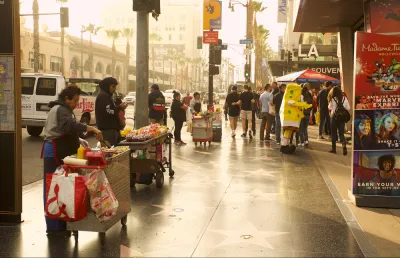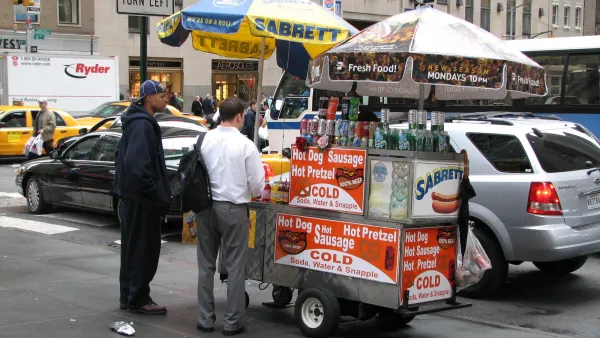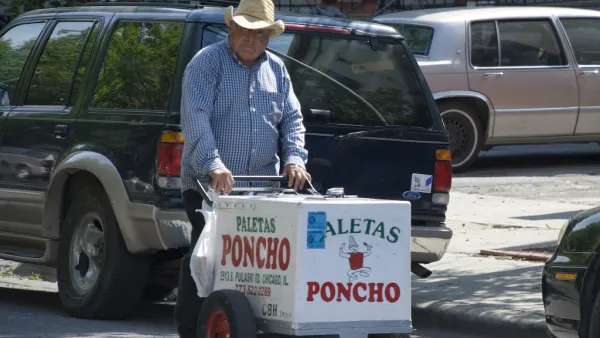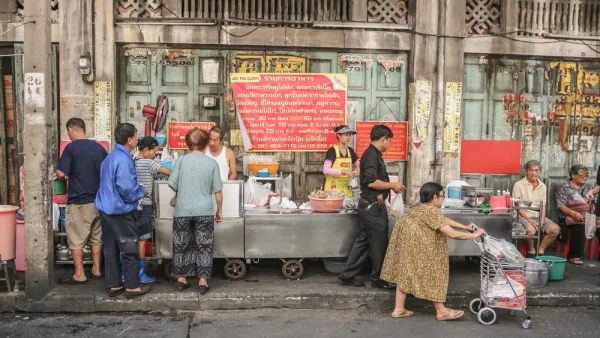With new regulations poised to add 400 new vendors to New York City's streets every year for the next decade, city leaders can look to L.A.'s recent legalization efforts for guidance.

As New York City gets ready to permit hundreds of new street vendors, Alissa Walker suggests some lessons the city can take from Los Angeles. "New York City, where antiquated street vending policies have created a competitive black market for permits, is poised to see a dramatic expansion of its street vendor system for the first time in four decades. Intro 1116, passed earlier this year, adds 400 new permits per year for a decade starting in 2022."
In Los Angeles, the "city council has had an ordinance decriminalizing vendors, backed up by a state law, the Safe Sidewalk Vending Act, passed in 2019. The city’s official permitting process began in January 2020 at a discounted rate of $291; later in the year, the city council made $6 million in grants available to help vendors pay for paperwork and equipment." But many L.A. vendors are trapped in a paradox: in order to pass inspection, vendors are required to have expensive cart setups that many of them can't afford, on top of permitting fees.
Community activists are working to find solutions. "Creating dedicated food hubs could help bring together vendors and mutual-aid groups to become a gathering place where neighborhoods could tackle food insecurity, says Todd Cunningham, the food and wellness organizer at Los Angeles Community Action Network, which is trying to improvise on that model when it serves community meals on Skid Row multiple times per week." Another organizer, "Carla De Paz, senior organizer at Community Power Collective, is working with the city on developing a 'special vending district' permit, that’s somewhere between a special event permit and a farmers market permit, she says."
Despite New York City Mayor de Blasio's promises to support street vendors, "[n]ot only are vendors still getting ticketed, some neighborhood groups, including alliances and BIDs, have found new ways to discourage vendors from selling on their streets, as a recent throwdown at Hudson Yards demonstrated." To succeed, the new permit system should also address "[c]ode compliance, changing laws at the state level, better relationships with regulators," and, critically, support for infrastructure such as communal prep kitchens, or commissaries, which help street vendors meet permit requirements and reduce costs.
FULL STORY: New York City Is About to Add 4,000 Street Vendors. Los Angeles Has Some Ideas to Borrow.

Analysis: Cybertruck Fatality Rate Far Exceeds That of Ford Pinto
The Tesla Cybertruck was recalled seven times last year.

National Parks Layoffs Will Cause Communities to Lose Billions
Thousands of essential park workers were laid off this week, just before the busy spring break season.

Retro-silient?: America’s First “Eco-burb,” The Woodlands Turns 50
A master-planned community north of Houston offers lessons on green infrastructure and resilient design, but falls short of its founder’s lofty affordability and walkability goals.

Test News Post 1
This is a summary

Analysis: Cybertruck Fatality Rate Far Exceeds That of Ford Pinto
The Tesla Cybertruck was recalled seven times last year.

Test News Headline 46
Test for the image on the front page.
Urban Design for Planners 1: Software Tools
This six-course series explores essential urban design concepts using open source software and equips planners with the tools they need to participate fully in the urban design process.
Planning for Universal Design
Learn the tools for implementing Universal Design in planning regulations.
EMC Planning Group, Inc.
Planetizen
Planetizen
Mpact (formerly Rail~Volution)
Great Falls Development Authority, Inc.
HUDs Office of Policy Development and Research
NYU Wagner Graduate School of Public Service




























